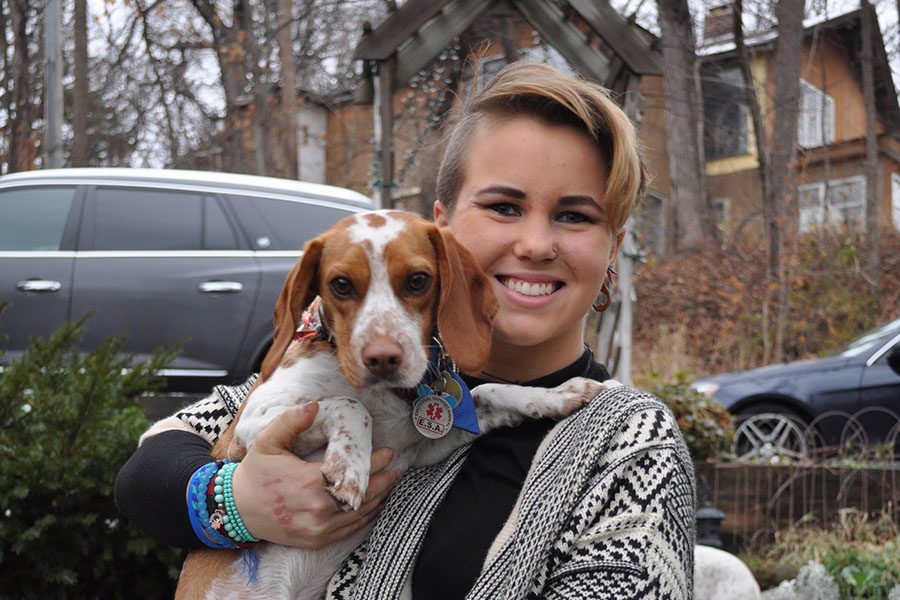BSM welcomes first Emotional Support Animal
Photo Courtesy of Elyse Vandersteen
Elyse brings E.S.A. Peeve to school everyday.
December 20, 2016
Lately, a new addition has been added to the BSM family. Many students have noticed a cute little dog roaming the hallways—it is not the drug dog—it’s Senior Elyse Vandersteen’s service dog Peeve. Vandersteen has Peeve by her side to help sense a change in her anxiety, depression, and type one diabetes.
Peeve is a certified Emotional Support Animal (E.S.A.). He notifies Vandersteen before she gets an anxiety/panic attack, and he is there to comfort her while it happens. Peeve helps calm her anxiousness and nervousness in class, and helps her take better control of it. In addition to being an E.S.A. dog, he is also being trained to be a Diabetic Alert Dog (D.A.D). He will be able to sense when her blood sugar drops low or increases. “I trained Peeve myself, with a little help from my family members. He had to learn basic, but specific commands to be able to get certified as an E.S.A dog. Although, I do need to bring him to a place to get trained in order for him to get certified as a D.A.D.” Vandersteen said.
He wasn’t always a service dog, though. Vandersteen’s sister actually adopted Peeve in Missouri last year over Thanksgiving break. He was an eight-pound Lemon Beagle. Her sister adopted him because she knew Vandersteen wanted a service dog. “At this point, he was just an average puppy—no training, no certification, etc.,” Vandersteen said.
Though Vandersteen enjoys having Peeve around, it involves some hard work. She has to let him go to the restroom, feed him, give him water, and sometimes give him treats for good behavior. Peeve accompanies Vandersteen to school everyday. “Peeve goes to all of my classes with me and sits by my feet on his little blanket. He stays quiet or calm unless there is a sudden change in mood or energy levels on me,” she said.
The school reacted well to having Peeve. They were very helpful and wanted Vandersteen to have an easy transition to school. Although the student body is usually respectful towards both Vandersteen and Peeve, there have been a few exceptions. “He’s been kicked and stepped on a few times due to people not paying attention and being oblivious. Some people ignore the ‘Working Dog: Do Not Pet’ sign on his vest, and pet him when we walk by anyways, which distracts him from walking to where we were going and his service to me,” Vandersteen said.
Some students disapprove of Peeve’s presence here at school. “I’ve gotten a few mean comments and dirty looks, but I just have to shake it off. Some students are disrespectful and irritating, but it’s gotten a lot better as the year has gone on because they have gotten used to seeing him in the hallways or in class with me,” Vandersteen said.
Vandersteen brings Peeve mostly everywhere she goes, but sometimes she does let him take a little break. She doesn’t want him to get too overwhelmed. “He is a dog, so he will do dog like things such as wanting to play with squeaky toys or bones and wanting to take naps, so I need to allow him to have “play time” or “time to be a dog” everyday either before, after, or in the middle of my activities,” Vandersteen said.
Peeve means a lot more to Vandersteen than just being a service dog. They are like two peas in a pod—best friends. The time they spend together is valuable, because it allows Peeve to know her enough to be able to do his job and sense when she becomes sad or upset. Vandersteen feels empty and lost when not with Peeve. Vice-versa, Peeve whines and mopes around when separated from Elyse. “He makes me feel happy and I know I have something to live for and wake up for to take care of,” she said.
Peeve will always support Vandersteen when she is having a tough day. He is not only her service dog, but her best friend. Although some people may judge, Peeve is there to help Vandersteen, and he does his job well. “I am definitely glad I got Peeve. He’s my best friend and I love him and rely on him to be there for me,” Vandersteen said.




































![Teacher Lore: Mr. Hillman [Podcast]](https://bsmknighterrant.org/wp-content/uploads/2025/03/teacherlorelogo-1200x685.png)














k. Carroll • Jan 20, 2017 at 10:18 am
Mental health diseases are a real issue, and I don’t believe the above comment reflects the BSM values and teachings that we hold ourselves out as having. In a community that stands for love and compassion for all, and treating all others with respect, despites their handicaps or illnesses, I would hope that this student would receive the support and compassion from all the students and staff.
It is easy to talk to the talk of being a loving and compassionate community, but the real story is whether we walk the talk. I commend Elyse for being brave and not hiding the mental health issues she faces. I am certain that there are many students that suffer in silence for fear of ignorance about mental health issues.
Andy Hudlow • Dec 21, 2016 at 11:10 am
I’m an alum now, so it’s possible I don’t fully understand the situation, but it seems like having a cute little dog roam the halls would be a distraction for her and other students. This may also set an interesting precedent, if other students at BSM with anxiety or depression would like a dog, then the administration will have no grounds to refuse them. From my perspective allowing this seems like a bad call, but I hope I’m mistaken.